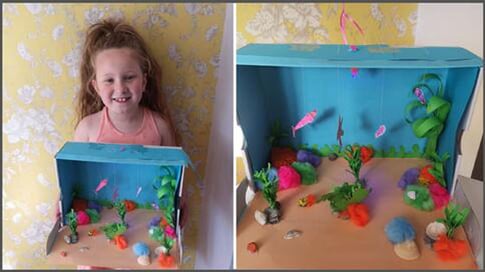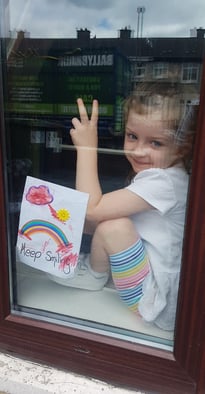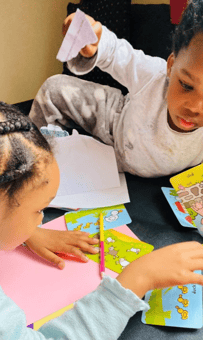
On a normal working week, home visitors from Early Learning Initiative’s ParentChild+ programme bring the gift of playtime into homes across Dublin’s inner city by providing disadvantaged families with the educational materials they need to encourage their child’s early learning and development. Research tells us that a child born into poverty is more likely to start school without the basic knowledge and skills they need to keep up with their peers. One factor of future academic success is a positive and nurturing home-learning environment. By providing families with educational support early in the child’s life we can help to give that child the best possible start.

When COVID-19 restrictions led to the closure of the NCI campus and the suspension of face-to-face home visits, ParentChild+ had to think fast. ‘Visits’ could still take place through virtual means, but what about one of the core principles of early learning, what about hands-on play?
Very young children learn by doing, by exploring, by creating. For vulnerable children, the closure of crèches had a greater impact than for those with more resources at home. The health guidance to ‘stay at home’ amplified the need to provide families with educational activities they could do by themselves.
Programme coordinators quickly put together art activity packs for distribution among disadvantaged families in the community. The packs contained a variety of items such as paper and crayons or markers for drawing, craft items like pipe cleaners, glue, pom-poms, stickers and googly eyes, safety-scissors, counters and activity sheets, Play-doh and - best of all - a bedtime story. These non-prescriptive packs were designed to encourage children’s fine motor skills, creativity, hand-eye coordination and early literacy and numeracy skills.
360 activity packs have been distributed so far, not just to families already part of the ParentChild+ programme, but also to children referred by Family Support Workers, Public Health Nurses, Social Workers, Home School Liaisons and children living transitional housing and emergency accommodation.
Families receiving the packs have been so appreciative of the support at this most difficult and challenging time.
“As a coordinator, it has been an incredibly rewarding and privileged experience to be able to reach out, in the midst of this crisis, to let families know that, despite the barriers, we are here to support them. This wouldn’t be possible without ELI funders, whose generosity is now making every day a little better for some of the most marginalised people in our community,” says Jennifer O’Neill, ParentChild+ Home Programme Coordinator.
We asked Jen for some tips for parents of preschoolers:
Tip 1: Floor Time: As a parent you are your child's first and best teacher. As well as the play opportunities in their environment, they will learn from the interactions that they have with you. Make regular time to sit with your child on the floor. Being at their eye level will encourage them to involve you in their play.

Tip 2: Serve-and-Return: Serve-and-return interactions are a great way to engage with your child. Even if your child doesn't have any words, you can still talk, label, comment or narrate their play, and then pause to give your child a chance to respond. Asking open-ended questions also helps to encourage back-and-forth conversation. If your child doesn't have the language or the interest to respond, you can model the answer or response. For babies, serve-and-return interactions can be as simple as playing peek-a-boo!
Tip 3: Play opportunities: Water play, construction, outdoor play, creative play, pretend play, small world play... opportunities for play are endless! Children learn and develop through play. Ensuring that you provide your child with a variety of activities will help keep them stimulated and avoid boredom. This does not mean spending a fortune on expensive toys but rather being creative yourself, making a shaker out of a bottle and rice, or a tent from a bed sheet.
Tip 4: Limit Screen Time: Too much screen time leaves less opportunity for hands-on learning to take place. Guidelines vary but, in general, screen time is not advised for children under 18 months, apart from video calling/Facetime. For older children, it is recommended that parents limit the amount of time on screens and, when they do allow it, choose high quality educational and interactive media content.
Tip 5: Follow your child's lead: Children spend so much of their day being directed or instructed by adults. Following your child's lead during play allows your child to make their own decisions and feel in control.
Tip 6: Story Time: It's never too early to introduce books to your child - starting with simple hardback picture books and lift-the-flap books. Allow your child to hold the book and turn the pages themselves. Point out and label items in the book. Ask open-ended questions. Talk about the pictures. Leave books freely available at your child's eye level. Bedtime is a perfect time to enjoy a book, as young children are typically more willing to sit for a story if they are winding down to sleep. Changing and exaggerating your tone of voice during a story will help to keep children engaged.
You can find more tips for spending quality time with children of all ages in these blog posts by Director of the Early Learning Initiative, Dr Josephine Bleach.










